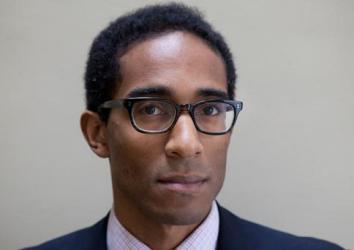Please send your questions for publication to gentlemanscholarslate@gmail.com. Questions may be edited.

Photo by Christina Paige
I’m a white guy living near a black barbershop. This shop does a brisk business, and so far as I can tell (walking by twice a day on my commute to work), 100 percent of the clients and barbers are black. What’s the right way to find out if (a) I’d be welcome in the shop, and (b) they can cut white hair well?
Thank you for your question.
In pursuit of the best answer to it, I wrote to my mother, as we all ought to do more often. (We all ought to write our own mothers, I mean, not just mine, pleased though she is to receive mail.) My mother’s father—“Negro,” read the birth certificate—had a barbershop in Richmond, Virginia, so I thought she might have some good advice. Mom said,
My dad only cut white hair because his shop was in the downtown business district and his clients were the lawyers, bankers, government workers, etc., who worked in that area. Also, I’m pretty sure it would have been against the law for whites and blacks to have used that same barber shop during the era that I grew up in in the South. It certainly would have been bad for business.
Black barbers know how to cut typically white hair as well as they know how to cut typically black hair. Because of slavery and the rape of black female slaves by their white masters, African-Americans are so racially mixed that we have almost as many different textures of hair as we do skin color and that includes the texture of silky, straight hair.
So here we have at once an explanation of why you should be comfortable getting your hair cut in that tonsorium and a passing glance at the history inspiring your discomfort. But Ta-Nehisi Coates is here to tweet your cares away.
Seeking further confirmation of my correctitude, I popped into a black barbershop in a racially diverse neighborhood, the On Point Barber Salon in Fort Greene, Brooklyn. The guys there, many of whom hailed from Jamaica, seemed to think your question was a bit naive, though they were too polite to say so outright. Perhaps 25 percent or 30 percent of their clients are white—natives of France and Australia and Vermont. No big deal. The only culture clash one can imagine going down at On Point concerns the proprietors’ decorating taste. People from a variety of cultural backgrounds will be horrified to see that these barbers adorn their mint-green walls with shows of support for Manchester United.
When purchasing items from your corner bodega or, say, a carryout sushi place in an American city, where the native language of everyone working there is unmistakably clear, is it more polite to address the people working there and conduct business in their language of origin, or your own? I have been told that even if you are fairly fluent and have a pre-existing rapport with the staff, the former would be seen as patronizing or impolite.
Thank you for your question.
Are we talking about salutations?—like, Bonjour? That’s cool, mais oui.
Basic niceties? A modest dōmo arigatō never hurt anybody; go for it.
A jolly exclamation lifted from the heart to a fond acquaintance? ¡Órale!
But if there is the slightest bit of doubt, you should bite your non-native tongue.
The pitfalls here are matters of tone. I mean, first of all, that you run the of risk sounding condescending by implying that you are reaching across a barrier to bond with an immigrant who may turn out to speak English better than you. There’s also the danger of coming across as something of a showoff, or a brown-noser, or a cultural tourist on par with those sophomoric college students who end their junior-year-abroad programs with the delusion of having been assimilated into a senior position in local society. This is not to mention that hella many carryout sushi places are run by sons of Korea.
Also, there is the problem of tone in the strict phonological sense. To take one famous example: It’s pretty easy to mix up the words ask and kiss in Mandarin Chinese and thus to earn a scowl from your waitress when all you really wanted was more duck sauce.
I recently started a job as a service writer/office chick at an auto dealership. What do I reply when someone I have just billed for a large amount of money says “thank you” to me? I do not feel “you’re welcome” is always honest, nor is “no problem.” I try to say “drive carefully,” “stay warm,” or “have fun with your new tires,” and I absolutely refuse the rote “thank YOU” comeback. Am I just thinking too much?
Thank you for your question.
Yes, you are thinking about this rather more than many people do, but that’s OK, as it indicates that you’re attempting to respond thoughtfully, and giving the appearance of being thoughtful is the task at hand.
Any cordial utterance indicating sincere appreciation for the customer’s business is permissible, with one exception. People who automatically answer a “thank you” with a “no worries”—an Australianism currently running rampant in parts of the globe traditionally less uncivilized than the Antipodes—are to be looked at askance. We should all be saving our “no worries” for moments when our interlocutors might actually be full of fret: “Thank you for being kind about my lousy Mandarin. I didn’t mean to harass you.” “No worries.” That’s how it should go. But delivered by a barista who has been thanked for his work, “no worries” hits the ear with a shaggy hauteur, and is best avoided.